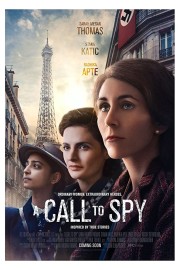A Call to Spy
Lydia Dean Pilcher’s “A Call to Spy” hits a lot of familiar biopic/WWII movie tropes in telling a story that should have been told a while ago. Like the Navajo codebreakers, the female spies this film shares the stories of are well worth knowing about, because their work helped win the war against fascism. It’s probably not surprising that this film and “Windtalkers,” the John Woo film that helped illuminate the story of the codebreakers, are rife with cliches and formulas along the way; that said, the stories are interesting enough to rise above those cliches, and hold our interest.
Writer-actress Sarah Megan Thomas, who plays the role of Virginia Hall, an American typist aiding the British military, and whom becomes one of the critical people in this story, has decided to focus “A Call to Spy” not solely on the perspective of her character, but that on Vera Atkins. Atkins is played by “Castle’s” Stana Katic, and she is the one of the key figures in the creation of the SOE in the early days of WWII to provide resistance, and sabotage against the German forces. Two of Atkins’s recruits are Hall, whose wooden leg has kept her from being an American diplomat, and Noor Khan (Radhika Apte), a Muslim pacifist. Soon, they are both in France, helping recruit and train resistance fighters against the German occupation, while Atkins tries to maintain trust from her superiors at home.
Pilcher’s film has a lot to say about the casual sexism of the time, as well as systemic discrimination of other races and people with disabilities, but it doesn’t hammer those issues home, rather letting them nestle into the cracks of the story, always being another part of the narrative unfolding. “A Call to Spy” is, primarily, a thriller, and it is a very solid one, with good performances and compelling characters shining light on a story, and legacies, that earned their time in the light, all while facing the darkest of darkness.










